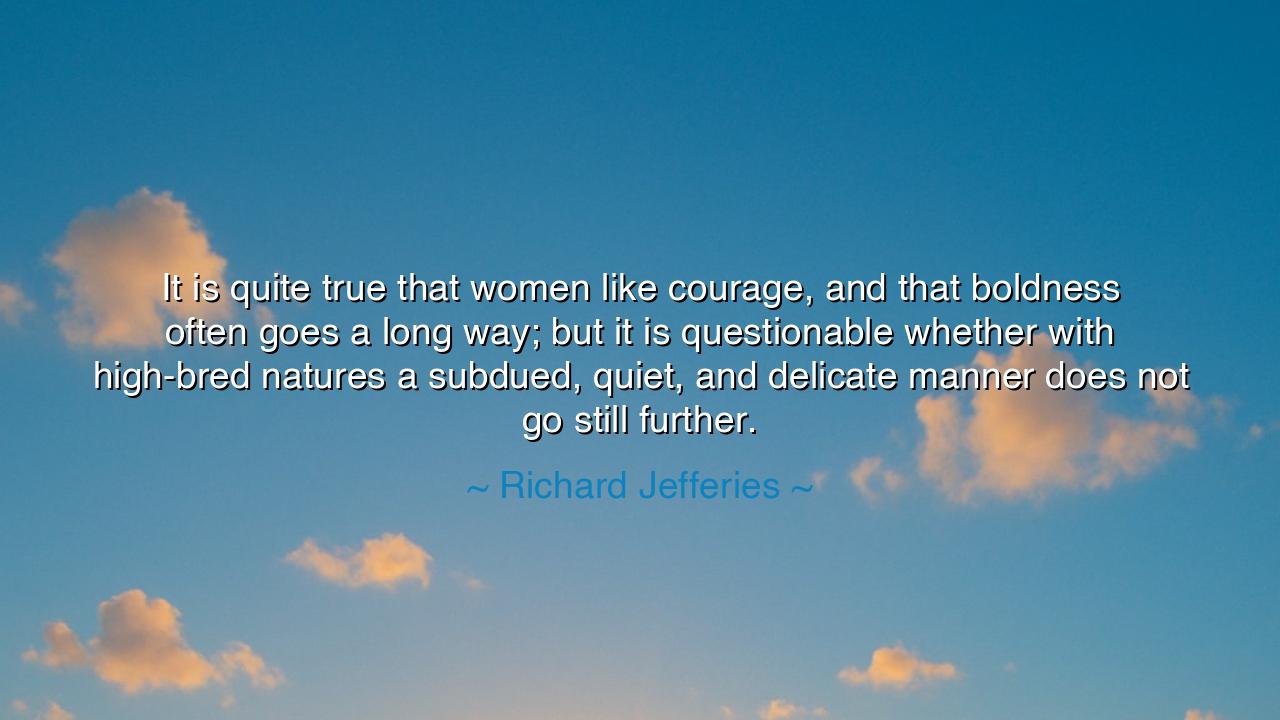
It is quite true that women like courage, and that boldness often
It is quite true that women like courage, and that boldness often goes a long way; but it is questionable whether with high-bred natures a subdued, quiet, and delicate manner does not go still further.






The English naturalist and philosopher Richard Jefferies, whose writings were filled with both poetic beauty and quiet insight, once observed: “It is quite true that women like courage, and that boldness often goes a long way; but it is questionable whether with high-bred natures a subdued, quiet, and delicate manner does not go still further.” In this reflection, Jefferies touches upon a truth not merely about romance, but about the nature of human character itself. His words speak to the eternal balance between strength and gentleness, between the outward show of confidence and the inward grace of restraint. For in every age, humanity has wrestled with the question: what moves the heart more deeply—power or poise?
The origin of this quote lies in Jefferies’ meditations on society and human nature during the late nineteenth century. Living in a time when outward assertion was celebrated—when men conquered, built, and proclaimed—he saw also the quiet virtues that stirred the soul more profoundly. Through his keen observation of nature, he had learned that the strongest forces are often the stillest ones: the growth of the oak, the steady flow of a river, the quiet light of dawn. In his wisdom, he applied this truth to human relationships, recognizing that while boldness may command attention, it is gentleness that wins the heart.
Jefferies’ words are a study in contrast. He acknowledges that courage—the willingness to act, to risk, to lead—has long been admired, especially by women who see in it the reflection of steadfast spirit. Yet he questions whether true refinement, what he calls “high-bred natures,” does not crave something deeper than outward valor. For courage without humility can harden into pride, and boldness without tenderness can become arrogance. The subdued, quiet, and delicate manner, by contrast, is the mark of one who possesses not only strength, but mastery over it—a soul whose power is refined into grace.
History offers many examples of this duality. Consider Marcus Aurelius, the philosopher-king of Rome. He commanded vast armies and wielded imperial authority, yet his writings in Meditations reveal a man of profound stillness, humility, and restraint. He did not shout his strength; he lived it quietly. It was this delicate strength—firm but serene—that inspired loyalty and love among his people. Likewise, in the realm of the heart, it is often not the loudest nor the most daring who wins affection, but the one whose presence carries peace. The rose, after all, does not need to roar to be admired; its fragrance and beauty speak in silence.
Jefferies’ insight also invites reflection on the deeper nature of true courage. The world often mistakes noise for bravery, but the ancients knew otherwise. The warrior who rages into battle is brave in one sense, but the one who remains calm in the face of insult or disappointment is braver still. The quiet courage of restraint—the ability to speak gently when provoked, to act kindly when wronged—is a rarer and nobler strength. Such souls, Jefferies suggests, carry a harmony that high-bred natures, those refined by wisdom and experience, instinctively recognize and cherish.
In this, Jefferies’ teaching aligns with that of Confucius, who said, “The superior man is modest in speech, but exceeds in action.” Boldness may open the door, but it is delicacy of spirit that sustains the bond. The subdued manner—marked not by weakness but by composure—reflects an inner confidence that needs no boasting. This kind of strength draws others not through fear or admiration, but through trust. It is a power so refined that it moves hearts without force, commands respect without demand, and wins love without pursuit.
So, my child, learn from Jefferies’ wisdom. Be bold when boldness is needed—when injustice must be challenged or truth must be spoken—but let your courage be tempered by humility. Cultivate a quiet strength, one that listens before it speaks and understands before it acts. The world may applaud the loud, but it is the calm spirit that endures. For gentleness, when rooted in truth, possesses a greater might than any shout of valor. The rivers carve the mountains not through fury, but through patience.
Thus, Richard Jefferies teaches us that the highest form of courage is not the roar of conquest but the delicate grace of self-mastery. To be subdued in manner is not to be weak—it is to wield strength with wisdom, to let peace become your power. Such a spirit not only wins affection, but cultivates harmony wherever it goes. And in the end, it is not boldness that builds civilizations or nourishes love—it is the gentle, steadfast strength of those who live with both courage and quiet grace.






AAdministratorAdministrator
Welcome, honored guests. Please leave a comment, we will respond soon